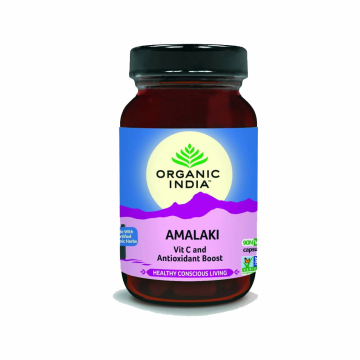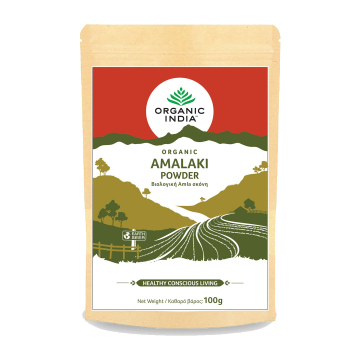Amalaki: Fruit of Heaven
Amla, also called Amalaki and Indian Gooseberry, is referred to as “The Mother” in Ayurveda due to its support of everything from the immune and cardiovascular systems to the digestive and excretory systems. In Ayurveda, it is classified as a rasayana, meaning it has restorative properties that invigorate the whole mind-body-spirit system. The fruit, which is around the size of a golf ball, has long been used both for culinary purposes and in traditional remedies for a wide range of ailments. It is best known for its vitamin C content, and contains approximately 20 times more vitamin C than oranges.
Amalaki is a wild-crafted product, meaning it is gathered from the forests of India rather than cultivated by farmers. ORGANIC INDIA Amalaki is harvested from forests that are designated as “organic” environments by the government of India — this ensures that wild Amalaki trees are protected from environmental pollutants and over-harvesting.
What sets ORGANIC INDIA Amla apart?
ORGANIC INDIA takes every avenue to operate in a way that is Beyond Sustainable, for both the planet and the amazing partners we work with. Our Amla is grown, harvested and prepared in adherence to the following principles and practices:
Amla Benefits for Mind and Body
The fruits, seeds, and leaves of the Amla tree have been used in traditional systems for thousands of years for everything from stress relief to cardiovascular support. In modern times, there have been more than 1000 phytochemical analyses and clinical studies done on Amla to reinforce its efficacy. One study refers to it as a “wonderberry,” and lists its uses as a diuretic, laxative, liver tonic, refrigerant, stomachic, restorative, alterative, hair tonic and more. Here are some of the top benefits of Amla:
Traditional Significance of Amla
Amla holds symbolic, religious and health significance and is known as a magical elixir. In Hinduism, it is believed a heavenly nectar known as Amrita, or the elixir of life, fell from the Gods to the earth, from which Amla trees grew. The fruit is also referred to as a divyaushada, or divine remedy, because it contains all five tastes of sweet, sour, bitter, astringent and pungent that aid and protect the body. To this day there is a Hindu festival that takes place between October and November to celebrate the tree’s physical, mental and spiritual benefits. In Buddhism, the Amalaki tree was a gift to the Buddha’s students from the Emperor Ashoka, and was believed to help students attain enlightenment.
Where is Amla grown?
ORGANIC INDIA Amla is sourced from organic-certified forests in Madhya Pradesh, India. While India is the largest producer of the plant, it can be found growing throughout Southeast Asia and thrives in rich, loamy, well-draining soil.
Who is it for?
Whether for kids or adults, Amla is a beneficial addition to anyone’s health regimen. It is great for all around immune function, whole body cleansing, and cognitive support. It is extremely versatile and easy to consume in supplements, powder, tea and even whole form if you can locate it.
Amalaki for Healthy Conscious Living
ORGANIC INDIA’s Amalaki is wildcrafted according to ancient Ayurvedic regenerative cultivation practices to ensure the highest possible efficacy, or “prana.” All ORGANIC INDIA herbs are processed and tested in compliance with FDA and World Health Organization safety protocols.
At ORGANIC INDIA, we recognize the vast interconnectedness of life. From seed, to soil, to field, to factory, our products empower the farmers of India, promote environmental and economic recovery, and provide wellness solutions derived from nature’s intelligence.










Validate your login